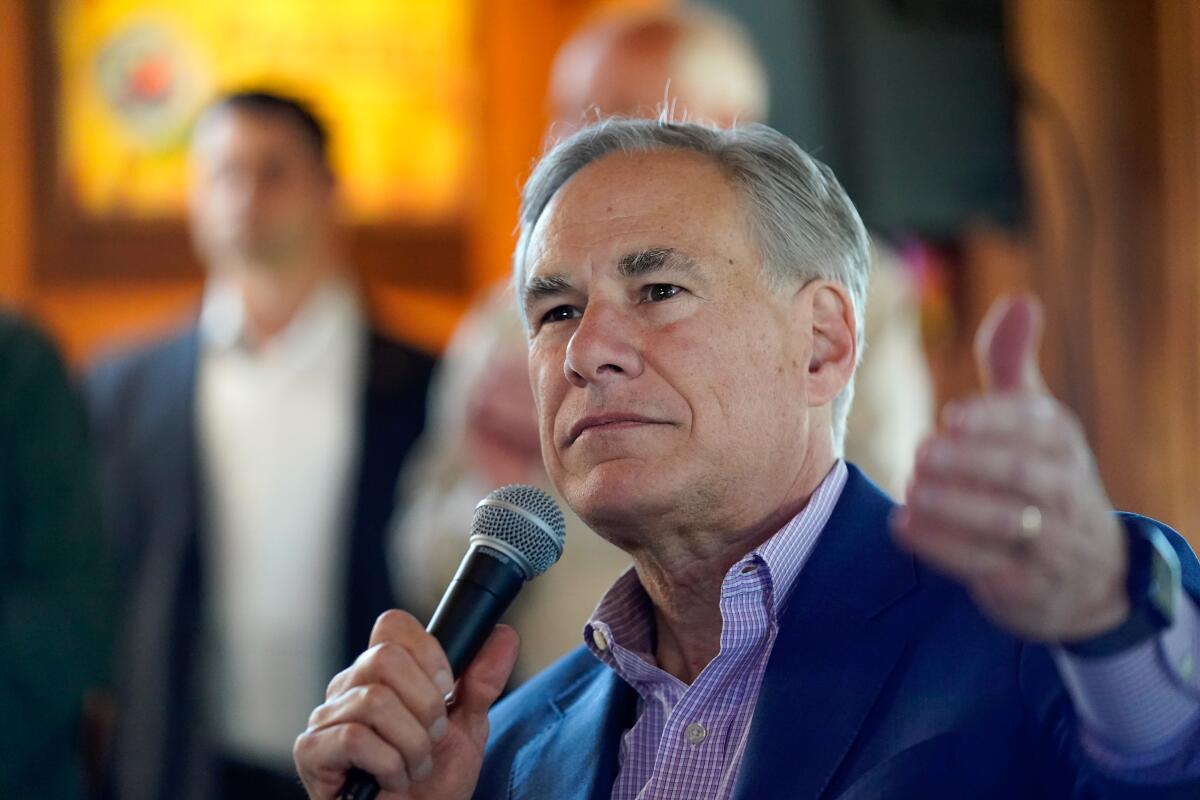Supreme Court blocks Texas law to shield conservatives against alleged censorship on Facebook and Twitter

- Share via
WASHINGTON — The Supreme Court on Tuesday put on hold a Texas law that targets “Big Tech” and authorizes the state to sue Facebook, Twitter and other popular social media websites if they censor or discriminate against conservatives.
Acting on an emergency appeal from a coalition of tech trade groups, the justices issued an order to stop enforcement of the law.
The vote was 5 to 4.
Conservative Justices Samuel A. Alito Jr., Clarence Thomas and Neil M. Gorsuch dissented; liberal Justice Elena Kagan said she would have also denied the stay.
Speaking for the conservatives, Alito said the court should have stood aside for now. He said the “ground-breaking Texas law ... addresses the power of dominant social media corporations to shape public discussion of the important issues of the day.”
He said the court’s decision to block the law for now represented a “significant intrusion on state sovereignty. Texas should not be required to seek preclearance from the federal courts before its laws go into effect.” Thomas and Gorsuch joined his dissent.
Kagan did not join the dissent and did not explain her views.
The case of NetChoice vs. Paxton posed an early Supreme Court test of whether conservative states may regulate what appears on social media platforms. The answer so far is no.
Florida and Texas, the two largest red states, passed similar measures last year targeted at what Florida Gov. Ron DeSantis called “the big tech oligarchs in Silicon Valley” and their “radical leftist” agenda.
Before signing the Texas law, Gov. Greg Abbott tweeted: “Too many social media sites silence conservative speech and ideas and trample free speech. It’s un-American, Un-Texan, & soon to be illegal.”
Florida’s law was blocked by a federal judge and the U.S. 11th Circuit Court of Appeals in Atlanta.
The Texas law had been blocked as well by a federal district judge, but on May 11, the 5th Circuit Court in a 2-1 decision and with no explanation ruled the law may take effect.
Lawyers for the social media platforms appealed directly to the Supreme Court. They sought an order to put the law on hold while the legal challenges proceeded in the lower courts.
They argued the Texas law is unconstitutional because it gets the 1st Amendment backward. As usually understood, the 1st Amendment’s guarantee of “freedom of speech” prohibits the government from regulating speech or censoring the publishing of views and opinions.
Lawyers for the tech lobbying group NetChoice called the court’s intervention “welcome news.” Chris Marchese, counsel for the group, called the Texas law “a constitutional trainwreck.... We are relieved that the 1st Amendment, open internet and the users who rely on it remain protected from Texas’s unconstitutional overreach.”
In defense of the law, Texas said it had the authority to regulate privately run social media platforms to protect the speech of conservatives from being excluded or discriminated against.
The Texas law says a social media platform with more than 50 million users in the United States “may not censor ... or otherwise discriminate against expression” of users based on their viewpoint. The targets of the law appear to include YouTube, Instagram and TikTok as well as Facebook and Twitter. Violators could be subject to daily penalties.
NetChoice and the Computer and Communications Industry Assn. urged the high court to intervene. They said the Texas law, if upheld, would deny social media platforms the right to remove offensive posts and instead make them “havens for the vilest expression imaginable.”
They said platforms would be forced “to disseminate all sorts of objectionable viewpoints — such as Russia’s propaganda claiming that its invasion of Ukraine is justified, ISIS propaganda claiming that extremism is warranted, neo-Nazi or KKK screeds denying or supporting the Holocaust, and encouraging children to engage in risky or unhealthy behavior like eating disorders.”
In defense of the law, Texas attorneys said social media platforms that are open to the public are the 21st century equivalent of the “traditional common carrier,” such as telephone lines. As such, they must be truly open to all and may not “assert a 1st Amendment right to refuse service to their customers based on the viewpoints those customers profess,” they said.
While the Texas law remains on hold, the challenges to its constitutionality will continue before a federal judge in Austin, Texas.
More to Read
Get the L.A. Times Politics newsletter
Deeply reported insights into legislation, politics and policy from Sacramento, Washington and beyond. In your inbox three times per week.
You may occasionally receive promotional content from the Los Angeles Times.











